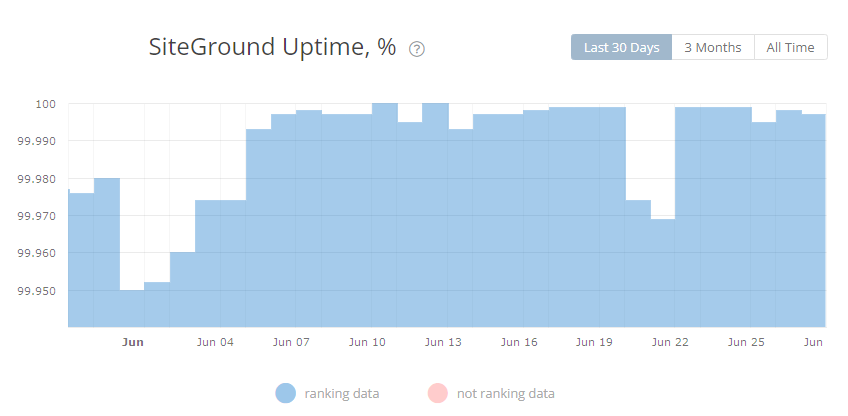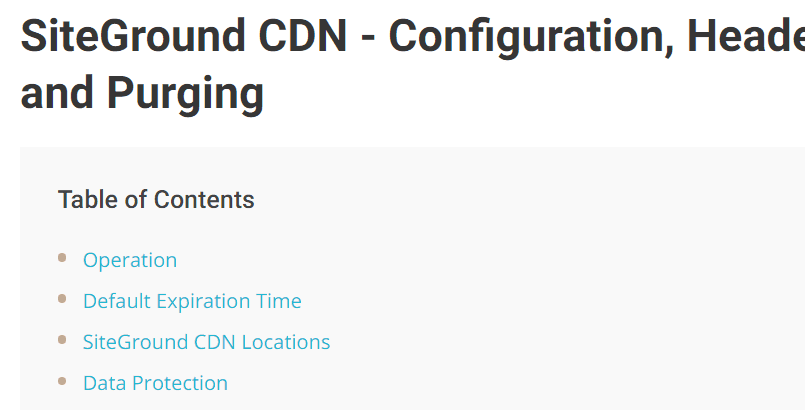| Review factor | Winner |
|---|---|
| Plans and pricing | SiteGround (4.5) |
| Features | Tie: SiteGround (4.5) / Bluehost (4.5) |
| Performance and uptime | SiteGround (4.8) |
| Security | SiteGround (5.0) |
| Support | SiteGround (5.0) |
| Improvements | SiteGround (4.8) |
| Best overall | SiteGround (4.7) |
SiteGround vs. Bluehost: Specs
| Password manager | Details | Basic plan features |
|---|---|---|
| Bluehost Overall rating: Read our full Bluehost review. | Starting price: $2.95 per month Hosting packages: Shared, WordPress, VPS, Dedicated |
|
| SiteGround Overall rating: Read our full SiteGround review. | Starting price: $2.99 per month Hosting packages: Shared, WordPress, WooCommerce, Cloud |
|
SiteGround vs. Bluehost: Plans and Pricing
Plans and pricing winner: SiteGround | |
|---|---|
| SiteGround (4.5) | Starts at $2.99 per month |
| Bluehost (4.0) | Starts at $2.95 per month |
In strict terms of pricing, Bluehost is cheaper than SiteGround. The lowest cost plan that SiteGround offers costs $2.99/month and after the promotional rate expires that increases to $14.99. Bluehost’s most basic plan starts at $2.95 then increases to $10.99 per month after introductory pricing expires.
While SiteGround is slightly more expensive when compared to Bluehost, we still think it offers better value overall. It offers more features at each plan level and outperforms in multiple areas of web hosting. It loads faster and offers more than just the basics, such as WAF, a real-time monitoring system, an artificial intelligence (AI) antibot system, and free daily backups.
Ultimately, I think the slight price bump is well worth it and more than justified.
SiteGround vs. Bluehost: Features
Features winner: Draw | |
|---|---|
| SiteGround (4.5) |
|
| Bluehost (4.5) |
|
Both SiteGround and Bluehost offer similar hosting services such as shared web hosting, WordPress hosting, WooCommerce hosting, and cloud hosting. Bluehost does have more options, providing VPS hosting and dedicated hosting additionally, plus a free custom domain name for the first year of use. Both providers offer their own versions of free website builders, free WordPress installation, and a free content delivery network (CDN).
SiteGround offers a custom cPanel solution which seems more intuitive and is more powerful than the one offered by Blueground. SiteGround’s support is more responsive and their performance (speed & uptime) is superior. SiteGround also includes more premium features in its plans such as staging area and speed optimization options.
However, a free domain is nothing to sneeze at, and you’ll need one anyway once your website is ready for launch. Plus, Bluehost has a lot of great site tools and add-ons you can’t find on SiteGround. Ultimately, this ends in a wash, with neither service getting a leg up over the other.
SiteGround vs. Bluehost: Performance and Uptime
Performance and uptime winner: SiteGround | |
|---|---|
| SiteGround (4.8) | 99.9% uptime guarantee |
| Bluehost (4.0) | No uptime guarantee, but testing shows 99.9% uptime |
Both SiteGround and Bluehost have exactly the same uptime guarantee. While a guarantee doesn’t ensure that your website will actually be up 99.9% of the time, what it does do is offer each company a target and an incentive to hit that target — most services will compensate you (typically in a credit on your next bill) for time lost if it falls below the guaranteed threshold.
According to our tests, SiteGround servers had an average uptime of 99.989% over the past 30 days, which is quite impressive. Throw in an extremely impressive 622ms response time, and you’ve got a great package of speed and reliability.
Bluehost isn’t shabby, but it doesn’t quite hit those high marks. Bluehost servers had an average uptime of 99.854% over the past 30 days, which is standard for the industry.
SiteGround vs. Bluehost: Security
Security winner: SiteGround | |
|---|---|
| SiteGround (5.0) |
|
| Bluehost (4.0) |
|
Both SiteGround and Bluehost offer free SSL certificates, spam protection, and easy Cloudflare integration. But that’s about where the comparisons end, and SiteGround takes a commanding lead.
In addition to the security protocols listed above, SiteGround also uses a combination of live human monitoring and various security tools to ensure its servers and your website are as safe as possible. All servers use the latest PHP version 7 with the latest security fixes, and SiteGround uses systems to block bots and attackers. SiteGround users also get WAF, a real-time monitoring system, an artificial intelligence (AI) antibot system, and free daily backups.
If you pick SiteGround, your website will be in safe hands.
SiteGround vs. Bluehost: Support
Support winner: SiteGround | |
|---|---|
| SiteGround (5.0) |
|
| Bluehost (3.5) |
|
Both SiteGround and Bluehost offer 24/7 support through live chat in addition to phone support and am FAQ/Knowledge base. However, I’ve found that SiteGround’s support is more expert, efficient and helpful.
While overall, Bluehost’s support seems good, its support chatbot made it difficult to reach a live person, and when we finally got into the queue for a support representative, it took a long time for a support rep to come online to help. In one instance, it took almost an hour over two chat sessions before we were able to get connected to a support technician.
On the other side, I contacted SiteGround’s support team several times to see how well the staff would respond. In each case, I got a quick reply, and the knowledgeable people seemed to want to help me. I called the team on the phone and used the live chat feature, with a positive experience each time.
SiteGround vs. Bluehost: Improvements
Improvements winner: SiteGround | |
|---|---|
| SiteGround (4.8) |
|
| Bluehost (4.0) |
|
Both SiteGround and Bluehost are always updating and improving services, including adding features, adding data center facilities, and providing more services. However, yet again SiteGround has the upper hand, with a host of generally more impressive features.
While Bluehost’s partnership with Yoast is helpful, and new tools and management features are welcome, it can’t hold a candle to something like adding a new data center in Spain or creating a custom Content Delivery Network. There are big, impressive additions that make a victor here a no-brainer.
Should You Get SiteGround or Bluehost?
Bottom line winner: SiteGround | |
|---|---|
| SiteGround (4.7) |
Best for: E-commerce website owners, those who run personal websites, local and regional small businesses, and hobby or enthusiast website builders |
| Bluehost (4.0) |
Best for: Local small businesses, entrepreneurs, e-commerce, and personal website builders |
Ultimately, this wasn’t much of a competition. SiteGround wins this match-up, hands down. While SiteGround is slightly more expensive compared to Bluehost, it offers more and outperforms in multiple areas of web hosting. It’s faster, offers more security features than just the basics such as WAF, a real-time monitoring system, artificial intelligence (AI) antibot system and free daily backups. Its customer support is top notch, efficient and helpful according to both customer reviews and my own first-hand experience.
That said, there are still valid reasons to choose Bluehost – namely that of price. Bluehost didn’t fumble the ball here — it was merely outplayed. It’s still a valid option in a vast landscape and could still be the host that meets your needs best.
How I Evaluated SiteGround vs. Bluehost
I test web hosts based on the following factors:
- Plan value: What plans are available, and do they offer a good value?
- Ease of use: Is the dashboard easy to navigate?
- Support: How fast can you get help when needed, and is support genuinely helpful?
- Features: What features does the host offer, and how do they compare to similar competitors?
- Security: Does the host offer SSL certificates, Distributed Denial of Service (DDoS) attack protection, backup services, and scans for viruses and malware?
- Speed and uptime: Does the provider offer a fast, stable environment for your website? How does it perform in tests, and what kind of servers does the hosting company use?
- Recent improvements: What has the host done lately to update its technology and services?
Learn more about our review methodology.







